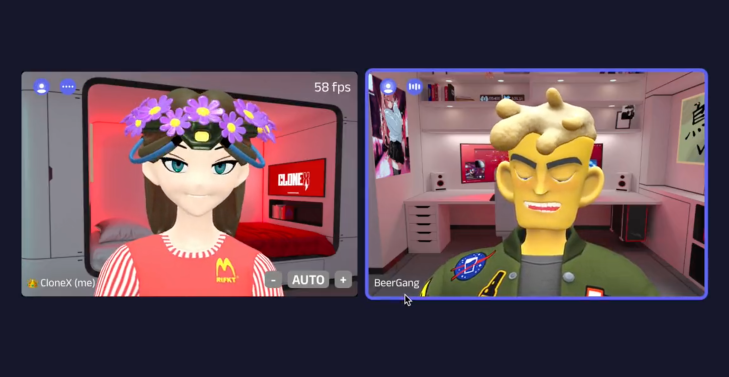[ad_1]

Critics have lengthy discredited non-fungible tokens as overpriced JPEGs offered by individuals who wish to make fast bucks. NFT believers wish to show them mistaken and present that these certificates of digital artwork saved on the blockchain, a distributed, immutable database, have actual use circumstances.
Their efforts typically contain integrating NFTs into functions already with mainstream adoption. Twitter, for instance, now lets customers authenticate their NFT profiles for a price so others know they really lay our a fortune on their Bored Apes relatively than having right-clicked on a JPEG.
What about making one’s NFT avatars discuss? Kakao Funding, a subsidiary of South Korean messaging large Kakao, has not too long ago put $2 million into GoodGang Labs, which allows customers to work together by means of animated avatars and shortly NFTs, like this:
South Korean corporations all the time appear to have a knack for the way the brand new technology likes to work together within the digital world. Naver, one other web conglomerate from the nation and proprietor of the favored messenger Line, launched the metaverse platform Zepeto again in 2018. The app has since attracted tens of thousands and thousands of kids around the globe to design digital experiences and commerce digital gadgets.
In truth, Naver and Naver Z, the previous’s subsidiary that runs Zepeto, each invested in Singapore-based GoodGang in beforehand undisclosed financings.
Having the help of two of Asia’s greatest social networking corporations exhibits that GoodGang is likely to be doing one thing helpful. Video calling by means of motion-tracked avatars isn’t a very novel thought. A San Francisco startup known as Hologram Labs raised cash final yr from buyers together with Mike Shinoda to construct a plug-in for Zoom and Google Meet so customers can seem as their NFT alter egos.
However GoodGang’s technique is barely completely different. The startup operates a two-pronged strategy. First, it runs a proprietary communications platform known as Kiki City, the place customers can work together as avatars, which could possibly be mental property from different platforms, similar to Line Subsequent and Zepeto.
Kiki City animates the avatars by having its AI mannequin infer information coming by means of the customers’ webcams and mics. It transmits solely movement and voice — relatively than video information — an strategy, in response to GoodGang’s co-founder Dookyung Ahn, that “conserves precious community assets but additionally enhances privateness by lowering the publicity of private visible info.”
The strategy permits Kiki City to make use of as much as 1,000 occasions much less information, notably when contemplating high-resolution 4K movies, Ahn informed TechCrunch.
The startup additionally powers different communication platforms with these capabilities by means of a SaaS API. This providing could possibly be interesting to social apps that wish to entice Gen-Z customers however don’t essentially have the willingness or potential to construct a brand new staff devoted to avatar animation.
GoodGang will quickly enable customers to work together by means of NFTs on a brand new platform known as GangHouse, which helps 2D and 3D property from a number of blockchains.
The startup was based by veterans from Fb, Line and augmented actuality startup Seerslab. Its current buyers embody Kimgisa Lab and Planetarium.
[ad_2]
Source link
